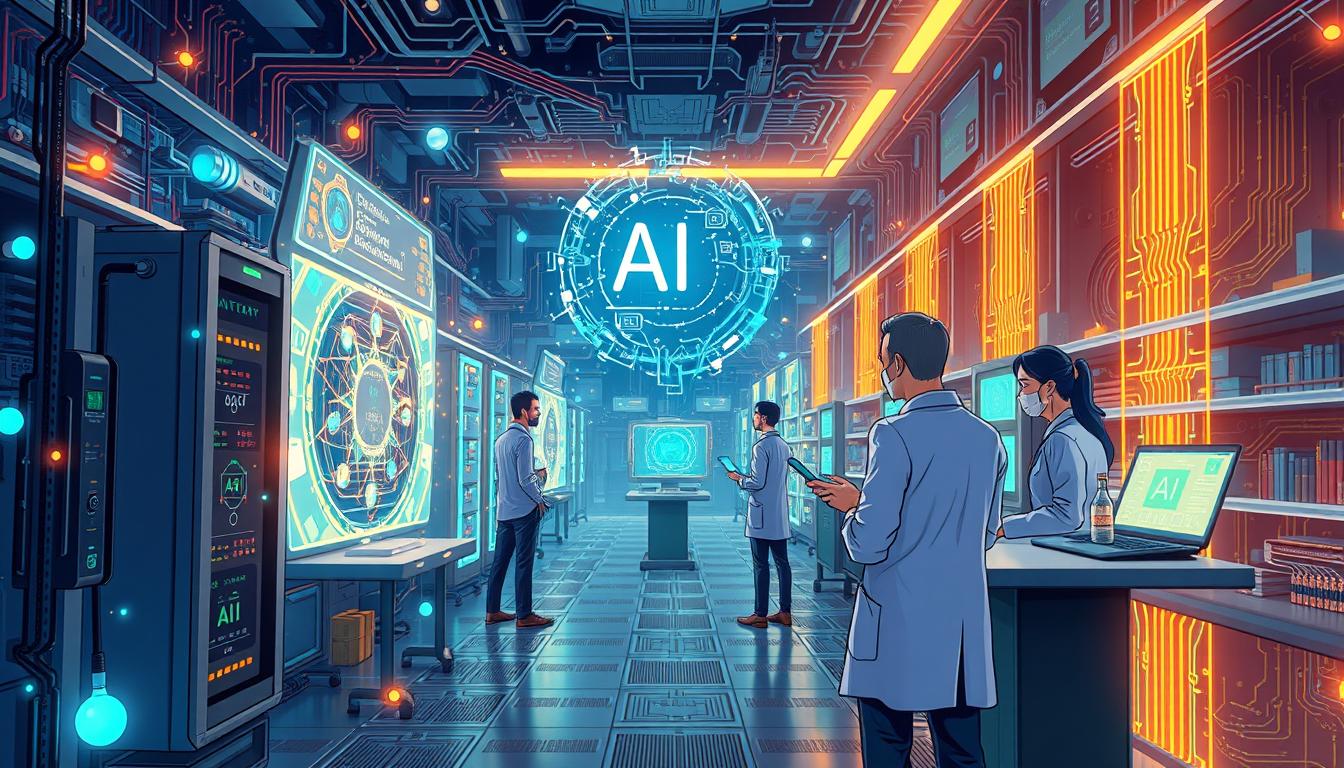AI in Quantum Computing Research: Advancing Science
Can AI unlock the full potential of quantum computing? This question sparks curiosity as we explore the fascinating world where artificial intelligence meets quantum information theory. The blend of these fields is changing how we see computational possibilities and scientific discovery.
AI in quantum computing research is driving innovation across various sectors. From finance to pharmaceuticals, quantum algorithms are changing how we process and analyze complex data. The global hyperautomation-enabling software market, closely tied to AI advancements, is set to reach a staggering $860 billion by 2025, according to Gartner.
In environmental science, AI-powered quantum simulations are making waves. These hybrid models offer better ways to understand vast amounts of climate data. This leads to improved insights into climate patterns and potential mitigation strategies. PwC reports that using AI for environmental monitoring could reduce global greenhouse gas emissions by up to 4% by 2030.
The finance sector is also benefiting from AI in quantum computing research. Quantum algorithms show promise in revolutionizing financial forecasting. They enhance the efficiency of analyzing market trends and risk factors. This synergy between AI and quantum information theory is paving the way for more accurate predictions and smarter investment strategies.
Key Takeaways
- AI and quantum computing synergy is driving innovation across industries
- Hyperautomation market is projected to reach $860 billion by 2025
- AI-powered quantum simulations enhance climate modeling and environmental strategies
- Quantum algorithms are revolutionizing financial forecasting and risk analysis
- Hybrid quantum-classical models accelerate drug discovery in pharmaceutical research
The Convergence of AI and Quantum Computing
Artificial intelligence and quantum computing are coming together. This mix is making new tools for solving hard problems. It’s leading to big steps in quantum computing hardware, optimization, and cryptography.
Defining AI in the context of quantum computing
AI in quantum computing means using machine learning to make quantum systems better. These algorithms help design quantum hardware, control qubits, and make quantum circuits more efficient. The blend of AI and quantum tech is expanding what’s possible in computing.
Historical development of AI and quantum computing
AI and quantum computing have grown a lot over the years. AI went from simple rules to complex neural networks. Quantum computing moved from ideas to real systems with more qubits.
| Year | AI Milestone | Quantum Computing Milestone |
|---|---|---|
| 1956 | Dartmouth Conference coins “Artificial Intelligence” | Richard Feynman proposes quantum simulation |
| 1997 | Deep Blue defeats world chess champion | First quantum bit (qubit) demonstrated |
| 2019 | GPT-2 generates human-like text | Google claims quantum supremacy |
Synergies between AI and quantum technologies
AI and quantum computing working together is showing great results. AI helps make quantum circuits more efficient. At the same time, quantum computing boosts AI in learning and data analysis.
This partnership is clear in quantum cryptography, where AI aids in creating secure encryption. As these areas grow together, we’ll see major breakthroughs in drug discovery, finance, and solving complex problems.
Fundamentals of Quantum Computing
Quantum computing uses quantum mechanics for calculations. It combines quantum information theory with new technology. This creates powerful systems. Unlike regular computers, quantum computers use qubits instead of bits.
Qubits can be in many states at once, thanks to superposition. This lets quantum computers handle lots of info at once. Entanglement is another key idea, where qubits can be connected in ways regular bits can’t.
Quantum algorithms use these special properties to solve tough problems quickly. For example, Shor’s algorithm can break down big numbers much faster. This could make many encryption systems obsolete.
Quantum sensing is also very promising. It uses quantum systems for super-precise measurements. This could change fields like medical imaging and navigation.
| Quantum Concept | Description | Application |
|---|---|---|
| Superposition | Qubits exist in multiple states simultaneously | Parallel computation |
| Entanglement | Qubits linked across space | Quantum communication |
| Quantum Gates | Operations on qubits | Quantum algorithms |
As quantum computing gets better, it opens up new areas in science and tech. It could help with everything from better supply chains to finding new materials. The possibilities are endless and very exciting.
AI in Quantum Computing Research: Current Landscape
The mix of artificial intelligence and quantum computing is changing science. This field is growing fast, with new areas to explore and leaders pushing the limits.
Key Areas of AI Application in Quantum Research
AI is making big moves in quantum computing. New quantum machine learning algorithms are being created. They aim to solve problems that classical computers can’t handle.
Another key area is quantum error correction. AI is helping to make quantum circuits more reliable. This is crucial for building stable quantum computers.
Leading Institutions and Companies
Big tech and research groups are leading in quantum computing. IBM, Google, and Microsoft are pouring money into quantum research. Universities around the world are also playing a big role in quantum advancements.
Recent Breakthroughs and Milestones
Recently, quantum computing has made huge strides. A big achievement was quantum supremacy, where a quantum computer beat a classical computer. This has brought more attention and investment to quantum tech.
| Year | Milestone | Impact |
|---|---|---|
| 2019 | Quantum Supremacy | Proved quantum computers can outperform classical computers |
| 2020 | Error Mitigation | Improved quantum circuit reliability |
| 2021 | Quantum Machine Learning | Demonstrated potential for AI-enhanced quantum algorithms |
As research continues, we’ll see more advancements in quantum machine learning and error correction. We’ll also see more practical uses of quantum computing.
Quantum Algorithms and Machine Learning
Quantum algorithms are changing how we solve problems in fields like cryptography, chemistry, and finance. They work with AI to create quantum machine learning. This mix makes algorithms that can do better than classical machine learning in certain tasks.
Quantum optimization is making a big impact in areas like logistics, portfolio management, and drug discovery. It solves complex problems that were thought impossible. Quantum algorithms have the power to change industries, offering new solutions to long-standing challenges.
Recent breakthroughs in quantum computing have led to the creation of nonlinear quantum processors (QNPs). These devices can find deeper, more complex details in quantum signals. They spot subtle connections that linear processors can’t see. This improvement helps us understand quantum systems better and boosts tasks like quantum state discrimination.
| Processor Type | Signal Processing Capability | Application Areas |
|---|---|---|
| Linear Quantum Processors | Basic signal amplification | Traditional quantum computing tasks |
| Nonlinear Quantum Processors | Dynamic adjustment for hidden patterns | Quantum state discrimination, complex problem-solving |
The move from linear to nonlinear quantum systems is opening up new possibilities. By using noise to their advantage, these systems offer better control over quantum processes. This is leading to major advancements in quantum algorithms and machine learning.
AI-Driven Quantum Hardware Optimization
AI is changing quantum computing hardware in big ways. It’s making qubits better and improving error correction. This is helping quantum tech move forward.
Improving Qubit Design and Control
AI is helping scientists make more stable qubits. These qubits can keep their quantum state longer. This means they can handle more complex tasks.
AI also helps control qubits better. This makes them work more reliably and efficiently.
Error Correction and Noise Reduction
Fixing errors in quantum computing is a big challenge. AI is making a big difference here. It uses machine learning to find better ways to correct errors.
This AI approach helps keep quantum information accurate. It works even when the environment is noisy.
Quantum Circuit Optimization
AI is also making quantum circuits more efficient. It finds the best ways to arrange quantum gates. This reduces the number of operations needed.
This optimization makes quantum computations faster. It helps overcome the limitations of current hardware.
| AI Application | Benefit |
|---|---|
| Qubit Design | Increased stability and coherence times |
| Error Correction | Improved quantum information integrity |
| Circuit Optimization | Faster and more efficient quantum computations |
As AI keeps improving quantum computing, we’re getting closer to real quantum advantage. These improvements are key for making quantum computers bigger and more useful in many fields.
Quantum Simulation and AI-Assisted Discovery
Quantum simulation is a powerful tool for studying complex systems. Scientists use AI to design and understand these simulations. This mix of quantum info theory and AI is changing research in many areas.
Scientists are working on quantum sensing for medical imaging and more. AI helps by analyzing data from these sensors. This team-up is exploring new scientific areas.
BlueQubit leads in quantum computing. They create algorithms for tough problems like simulating materials. Their work uses Python on real quantum hardware and simulators.
| Company | Focus Area | Quantum Hardware |
|---|---|---|
| BlueQubit | Quantum algorithms, Material simulation | IBM Heron (156 qubits), Quantinuum H2 (56 qubits) |
| QuEra Computing | Neutral atom quantum computers | 250 atoms |
BlueQubit teamed up with Honda Research Institute on quantum image classification. They loaded 2 million pixel images into 20 qubits. This shows quantum simulation’s power in handling big data.
The fusion of quantum simulation and AI is accelerating scientific discovery across various fields, from material science to financial optimization.
Quantum simulation and AI are making big strides in science. We’ll see more advances in drug discovery and climate modeling. The future of science looks bright with quantum-AI together.
Challenges in Integrating AI with Quantum Systems
The mix of AI and quantum computing is exciting but comes with big hurdles. Let’s look at the main challenges in this advanced field.
Technical Hurdles and Limitations
Quantum error correction is a big problem. Keeping qubits stable and growing quantum systems is hard. Scientists are working hard to find solutions.
Quantum optimization also has big challenges. As systems get bigger, making quantum circuits work well gets much harder. This makes reaching quantum computers’ full potential tough.
Ethical Considerations and Potential Risks
Quantum computing’s power raises big ethical questions. Quantum cryptography could break current encryption, which is risky. It’s important to develop AI responsibly to avoid misuse.
Addressing the Quantum-Classical Interface
Connecting quantum and classical systems is a big challenge. Moving data and processing between them needs new ideas. Researchers are finding ways to make these interfaces work better.
| Challenge | Impact | Potential Solution |
|---|---|---|
| Qubit Coherence | Limits computation time | Advanced error correction techniques |
| Scaling Quantum Systems | Restricts problem size | New qubit architectures |
| Quantum-Classical Interface | Slows data processing | Hybrid quantum-classical algorithms |
Beating these challenges needs teamwork from different fields. As research goes on, we get closer to using AI and quantum tech together fully.
Future Prospects: AI-Enhanced Quantum Technologies
The future of AI-enhanced quantum technologies is exciting. Quantum machine learning is changing drug discovery and materials science. It uses AI and quantum simulation to model complex molecules quickly. This could make drug development much faster.
Quantum sensing is a big deal for medical diagnostics. AI-powered quantum sensors can spot diseases early. They might also track climate change more accurately.
The financial world is looking at quantum tech for risk analysis and fraud detection. Quantum algorithms, powered by AI, can process huge amounts of data fast. This could make markets more stable and investments smarter.
| Technology | Potential Impact | Estimated Timeline |
|---|---|---|
| Quantum Communication | Unhackable networks | 5-10 years |
| Quantum Simulation | Accelerated drug discovery | 2-5 years |
| Quantum Sensing | Enhanced medical diagnostics | 3-7 years |
As quantum tech gets better, we’ll see more hybrid systems. These combine quantum and traditional computing. They will open up new ways to solve problems and analyze data.
Conclusion
The mix of AI and quantum computing is starting a new chapter in science. Quantum algorithms and quantum machine learning are changing what we can do. This is like the big tech boom after Paul Kennedy’s book in the late 1980s.
Just as America’s tech economy grew a decade later, quantum computing is ready for huge growth. This progress is like the respect for old wisdom in fields like astronomy and medicine, as the author wrote in 2023.
AI is making quantum hardware better, improving qubit design, and solving error problems. For example, studies on pump-turbines show how precise quantum simulations can be. This is thanks to advanced grid divisions and the SST k-ω turbulence model.
Looking to the future, AI and quantum computing will solve big problems in many fields. Models like OpenAI’s GPT-o1 show AI’s power in breaking down complex physics. We’re on the edge of a quantum revolution, ready to change our view of the universe and enter a new era of science.
Source Links
- How engineers are pioneering the future of AI and emerging technologies
- Hybrid Quantum-Classical Machine Learning Models: Powering the Future of AI
- TQI Exclusive: Boeing’s Jay Lowell on Pushing The Boundaries of Quantum Networking And Expanding The Reach of Satellite Technology
- Pressure Fluctuation Characteristics of a Pump-Turbine in the Hump Area under Different Flow Conditions
- Caffeine—Legal Natural Stimulant with Open Research Perspective: Spectroscopic and Theoretical Characterization
- How to prioritize innovation in the great automotive value shift
- 🤔 History-minded Up Wingers: Ancient Rome versus Victorian Britain. Pick your fighter.
- Robust Load Frequency Control of Interconnected Power Systems with Back Propagation Neural Network-Proportional-Integral-Derivative-Controlled Wind Power Integration
- All Milestone Costs & Rewards In Satisfactory
- Spatiotemporal Dynamics and Drivers of Coastal Wetlands in Tianjin–Hebei over the Past 80 Years
- Reimagining Quantum Computing: The Unexpected Lessons from the Brain
- China’s Quantum Ambitions May Face Headwinds From Weak Startup Ecosystem
- Hunting for Monolayer Black Phosphorus with Photoluminescence Microscopy
- ORPP—An Ontology for Skill-Based Robotic Process Planning in Agile Manufacturing
- Effect of Moisture on the Fatigue and Self-Healing Properties of SiO2/SBS Composite Modified Asphalt
- Superposition Guy’s Podcast — Hrant Gharibyan, CEO and Co-Founder, BlueQubit The Superposition Guy’s Podcast: Workforce Development
- Application of Single Cell Type-Derived Spheroids Generated by Using a Hanging Drop Culture Technique in Various In Vitro Disease Models: A Narrow Review
- The Future of Data Science: Integrating Quantum Computing for Advanced Analytics
- Cascading Landslide: Kinematic and Finite Element Method Analysis through Remote Sensing Techniques
- The Quantum Internet
- Breaking Down Physics Homework with GPT-o1: Making Tough Concepts Easy – NewsWatchTV







